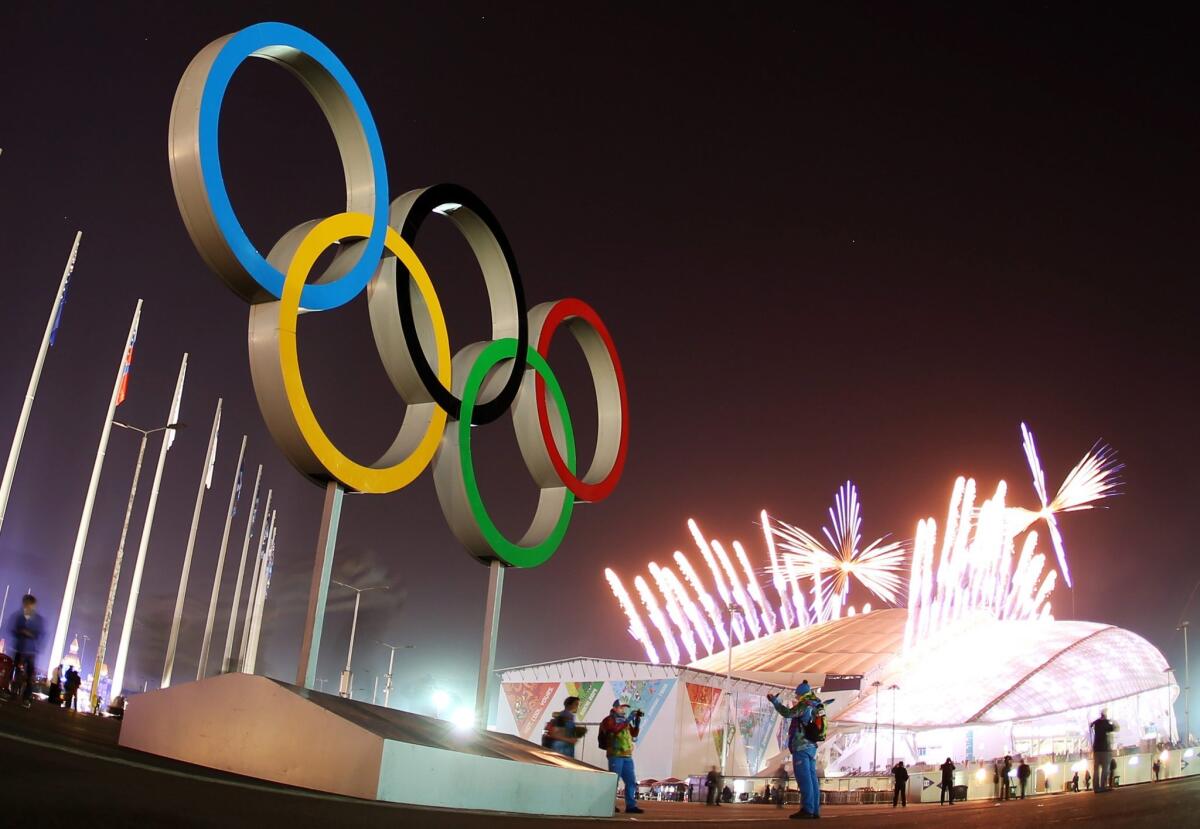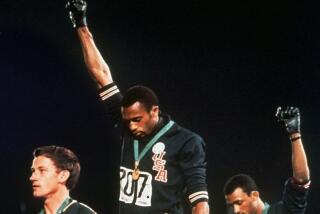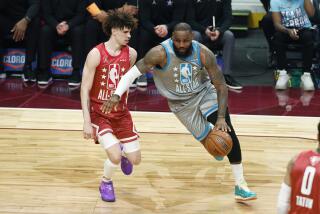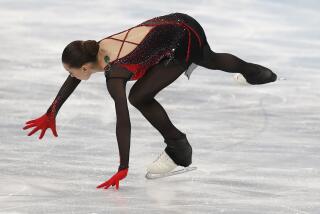Sochi Games TV: Seven Olympics thoughts after the closing ceremony

For the last 18 days, I’ve been chronicling TV’s coverage of the Sochi Winter Olympics, dutifully watching all manner of downhill ski races, luge runs and short-track heats. What effect this has had on me I’ll leave to an imminently convening team of Austrian psychiatrists (Austria, winners of 17 medals, including three golds in Alpine skiing, of which one was Mario Matt’s improbable win in the slalom). It was certainly an odd paradox, some of the most death-defying physical acts in the world understood through an act of extreme couch-potato-ing.
So with the giant bear now shedding his tear, it was time for a look back at the several days of national viewing and argument that is the quadrennial Winter Olympics.
NBC and its affiliated cable networks in many ways did an admirable job covering these Games, building a feeling of excitement, offering a sense of humanity and history and conveying the many threads of competition and camaraderie that makes up the Olympic Games -- all despite obstacles such as a vast time difference, unfamiliar sports, a sense of culture shock, unexpected athlete narratives and a nasty case of pink-eye.
PHOTOS: Olympic Games’ historic TV moments worth remembering
But some of its challenges were of its own creation -- bombastic announcers, artificial cliffhangers, the watering down of competitions and an obsession with athlete tragedy.
Here, then, are seven thoughts about how the Sochi Olympics played on TV for the last two-plus weeks -- the good, the bad, the weird and the Russian.
Announcing shifts. There was some very good commentating and very bad commentating as NBC assembled a team of Olympic veterans, ex-jocks and imports from other sports. First, the good. Speed-skating was a standout across the board. Apolo Ohno distinguished himself with astute commentary, the former decorated short-track speed skater providing a useful lens on the sport he once excelled at. If Ohno can sometimes sound overexcited and is a little too prone to big declarations, he is nonetheless insightful and able to distill a sport that sometimes flummoxes even its stars.
Even better than Ohno was Dan Jansen. Fans of a certain age will recall the American star’s tragic spills in the ’88 Games in Calgary. There’s something nice about hearing his calm, assured voice opposite Ted Robinson’s -- it was as though every call he made conveyed that all turned out OK for Jansen after that potentially life-shattering moment. And his ability to parse, and make interesting, spectacles that can often look like a lot of Dutch people with their hands behind their backs, is a special skill indeed. (Flat ice surfaces were generally a forum for strong Olympic commentating, as hockey also saw some notable work; more on that below.)
PHOTOS: Winter Olympics in film
Also on the positive side of the ledger, Chad Salmela’s exuberance for biathlon and cross-country skiing was a refreshing complement to events that can look like pole-carrying people going for endless, grueling grinds around desolate territory. And some of the Alpine coverage was very good too -- color commentary on Ted Ligety’s gold medal in the giant slalom and Mikaela Shiffrin’s in the slalom broke down how and why they were able to outmaneuver the competition.
But the sliding track sports need an overhaul. Leigh Diffey, normally a motor sports commentator, seemed to know little about the bobsled, luge and skeleton he was commenting on, instead making loud and grand statements about Americans but telling us almost nothing about what was happening. The next time NBC should bring someone in who knows the sport -- especially given how many medalists we now have in those disciplines. And NBC’s first team of figure-skating -- Tom Hammond, Scott Hamilton and Sandra Bezic -- was the usual cringe-y mix of schmaltzy sentiment and obscure lingo. They were most prominently shaky during the coverage of the Adelina Sotnikova-Yuna Kim blowup in the women’s figure-skating long program. At least there was hope in the straight talk of daytime commentators Johnny Weir and Tara Lipinski. The network can’t promote them fast enough.
Later with Bob Costas. When he was there, he was his usual great self -- polished, informed, wryly funny. The problem was he wasn’t there for about a week, as a seemingly benign case of conjunctivitis first got him some glasses, then a furlough in his hotel room as light-sensitivity and blurry vision did him in. Matt Lauer and Meredith Vieira filled in ably enough, but the subtle pushing that’s required from the studio chair was lacking from the “Today” correspondents, making the Olympics’ usually reliable broadcast gig, the prime-time guide, an uncertain affair.
Also on the subject of uncertain affairs, a generally consumerist Olympics turned even more commercial-heavy, as studies found that actual competition action made up less than a third of overall programming. No doubt that was aided by the vast time difference, which allowed NBC not only to cut away from sports so that there were more cliffhangers than in a “General Hospital” episode, but to essentially package events around the ads. At least some of those ads were fun and Olympic-themed (Liberty Mutual’s clip-heavy comeback spot, AT&T U-Verse’s touching ode to Alyson Dudek, United’s imagining of travel as a series of Olympic sports). But the litany was mind-numbing, and made any kind of non-DVR viewing at times painful. NBC’s promo-ing of its own shows was equally overwhelming -- I could swear by the end of it that “Growing Up Fisher” was about J.K. Simmons as a blind skeleton competitor.
PHOTOS: Celebrities by The Times
The athlete’s tale. Nothing throws networks for a loop -- and makes viewers more intrigued -- than when jock narratives don’t pan out as planned. Exhibit A at these Games was snowboarder Shaun White. The two-time halfpipe gold medalist was going for an unprecedented third victory, even pulling out of slopestyle to do it. But when he flubbed his first run and didn’t quite have enough for his second, NBC had to pivot and cover what would have been a coronation, in the words of Cris Collinsworth, as a more poignant moment of human fallibility.
The network was similarly adjusting on the fly to moguls champion Hanna Kearney, a dominant force and great story in past years, what with her having taken leave from Dartmouth to win gold in her bumpy chosen sport. But an extended segment on her proved moot when she could only muster bronze in the opening weekend event, a Pyrrhic victory she proceeded to underline by sounding crestfallen in the post-race interview, even later tweeting that “bronze feels like a broken heart.” NBC commentators made sure to note the strange turn, though could have gone a little further in explaining the tricky psychology that makes bronze sound like the promised land to some favorites (witness Canadian snowboarder Mark McMorris’ giddiness about same) and a shattered dream to others.
The network also respectably covered a pair of athletes some rivals would have ignored: downhill skiier Ted Ligety and bobsled medalist Steve Holcomb. Neither has the fizzy personality of a celebrity athlete, but each earned impressive medals in their respective disciplines and got plenty of studio love and call-outs just the same. Finally, just because, there was curling. There was a lot of curling. This was a good thing. Is there a sport cooler and more hypnotic (precisely because it is so uncool and not hypnotizing?) No amount of curling is too much. It may even be time to get a “hard! hard!” ring tone, come to think of it.
PHOTOS: Faces of the Sochi Olympics
Hockey hootenanny. Was there a more up-and-down sport to cover than U.S. hockey? From the elation of an overtime win over Russia to an embarrassing bronze-medal whooping at the hands of the Finns, nothing rode the TV roller coaster like pucks and sticks. (And that’s to say nothing of a seeming surefire American gold on the women’s side that over the course of a few minutes turned into a heartbreaking loss to those pesky Canadians.)
Doc Emrick’s comforting excitability and Ed Olczyk’s quiet insight helped get us through it all, especially during T.J. Oshie’s surreal six consecutive penalty shots during the Russia game. Between periods, things were solid -- if Mike Milbury and Jeremy Roenick can sometimes bring their ex-player conservatism to the booth, their collective wisdom added depth to a sport many viewers can easily connect to. Still, a little more questioning of how the team was assembled and then motivated would have been nice -- you don’t punk out in the Olympics for no reason at all.
The X (Games) factor. The Winter Olympics has added sports at an extraordinarily high rate in the last 20 years. That’s brought in younger viewers and American medals, though these new events aren’t always easy to present. For instance: Slopestyle is a hard enough concept to understand even if there weren’t a seemingly infinite number of varietals. But viewers should be glad it got into these Games, not only because it yielded oodles of medals but because it generated some of the best characters, particularly Sage Kotsenburg, the Spicoli of these Winter Games, and Jamie Anderson, who -- oops -- let slip that a lot of the athletes were getting their Tinder on during the Olympics.
Meanwhile, the ski slopestyle was made even better by American men sweeping the podium. Also, they’re often skiing backward up ramps. Backward!
PHOTOS: Behind the scenes of movies and TV
Team figure skating was a notable addition too -- if the rules and combinations seemed overwhelming, it gave us the distinct benefit of a 15-year-old Russian phenom dancing to music from “Schindler’s List.”
The death spiral. Olympics coverage on TV has been about the death of an athlete’s loved one since at least the aforesaid Dan Jansen lost his sister during the 1988 Calgary Games. But Jansen’s story was rare, and it was legitimate -- his sister was near death when he lined up for the first of his speed-skating runs, and his falling right off the starting line seemed directly related to it. Since then, though, the mother/cousin/sibling with a disability/terminal illness/tragic misfortune has become de rigeur, and at these Olympics you couldn’t hear about or from an athlete without hearing that tale too; in fact, it was more notable if you got through one of these segments and everyone was still alive. From Christin Cooper’s haranguing of Bode Miller about his late brother to Meredith Vieria’s focus on American skeleton medalist Noelle Pikus-Pace’s miscarriage, death was everywhere at these Games -- in fact, according to the Salt Lake City Tribune’s Nate Carlisle, there were more than 50 stories involving death across NBC and other media outlets.
Sure, a tragedy is a way for viewers to connect to athletes they don’t know about, and a human-interest story with the occasional tragic undertone is fine. But turning a sporting event into the obituary pages is exploitative and, after a while, lacking meaning. Here’s hoping that in Rio and Peyongchang NBC starts to trust we’ll care about the athletes even if they haven’t recently undergone a death in the family.
The kids are all right. Olympics are about breakout stars -- Michael Phelps in 2008 being, of course, the gold standard. NBC had those in spades and made sure to milk them for all they were worth this time out. Primarily, it had Gracie Gold, a U.S. figure skater who wasn’t on the map a year ago but stormed through U.S. nationals in January, and Mikaela Shiffrin, a fellow 18-year-old who’s been making waves on the slalom World Cup circuit. Shiffrin didn’t disappoint, winning gold in slalom Friday, and Gold did her part too, helping the U.S. to a team bronze and skating strongly for a fourth-place finish behind some world-class rivals. NBC slightly overdid the “this is the future” angle, but it’s true, they are, and these Games made us glad of that fact.
A different kind of upstart label, meanwhile, attached itself to the South Korean-born, Russian-dwelling Viktor Ahn, who was nothing short of dazzling on the short track -- this after missing Vancouver and changing nationalities in the interim. Ahn won four medals, including three golds, and NBC did a strong job covering his bizarre story.
Now for those Austrian psychiatrists...
ALSO:
Sochi Olympics TV: In Shiffrin and Ahn, celebrities born and reborn
Sochi Olympics TV: Noelle Pikus-Pace and the too-personal problem
Sochi Olympics TV: Did NBc cover the Sotnikova-Kim controversy well?
Twitter: ZeitchikLAT
More to Read
The complete guide to home viewing
Get Screen Gab for everything about the TV shows and streaming movies everyone’s talking about.
You may occasionally receive promotional content from the Los Angeles Times.







